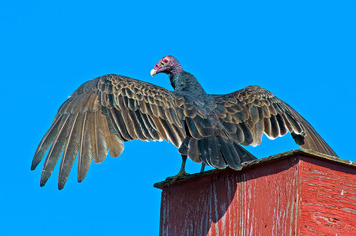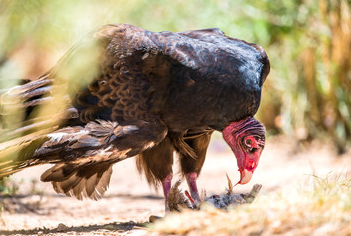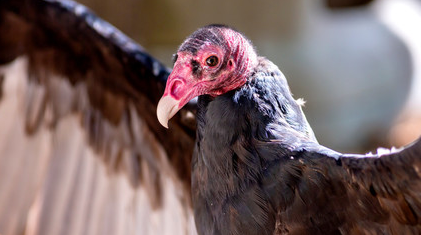What image comes to mind when you hear the word vulture? When I close my eyes, I picture omens of death, circling ominously overhead as if in an old western movie. Or my stomach is turned by imagining them scavenging on a dead deer along the side of the highway. The vulture’s reputation is not always exceptional, but while these birds might sometimes seem scary or gross, they are incredibly important to our local ecosystems and the health of our communities.

Perched Vulture
Colorado’s most common species of vulture is the turkey vulture, named for its red head and dark feathers which resemble male wild turkeys. When spotting turkey vultures from below watch for a dark body with gray flight feathers and tail, their characteristic red head and unsteady flight with few wing beats. They are seasonal residents who spend their summers breeding in Colorado and migrate south for the winter, often as far as Colombia or Ecuador. Turkey vultures are very social, typically living in large communities. Individuals can live for more than 45 years in captivity. Turkey vultures aren’t known for their songs or calls because they lack syrinxes or vocal organs and can only hiss and grunt.

There is perhaps some truth to the idea that turkey vultures are gross. They have no feathers on their heads so that when they stick them inside carrion or dead animals blood or guts don’t get trapped in their feathers. In addition to eating carrion, turkey vultures will also eat animal poop. They practice Urohydrosis, which is a fancy way of saying that they poop on their legs to cool themselves down and to kill off any bacteria on their legs. Turkey vultures vomit in self-defense when scared or threatened, and the combination of their strong stomach acid and partially digested meat is enough to deter most predators.

Vulture Eating Rotting Food
But those gross traits allow these birds to perform some incredibly important functions that are critical to the health of our ecosystems and our health as humans. That stomach acid is strong enough to kill anthrax, tuberculosis, rabies, botulism, cholera and salmonella. They have a powerful sense of smell that helps them find their rotting food from over a mile away, allowing them to get to their food first which helps to prevent any disease present from spreading to other animals They are frequently seen spreading their wings in the sun in what is called a Horaltic stance, which is believed to not only dry their wings but also help kill any bacteria trapped in their feathers. All of these amazing adaptations allow turkey vultures to eat things that would make most other animals extremely sick and their diet helps to prevent the spread of disease to wild animals, livestock, and humans.
These birds have a big impact on our communities, even if it might not always be visible. For example, in India the use of a livestock anti-inflammatory drug caused a 95% decline in the population of local vultures, leading to an increase in the incidences of rabies that cost those communities around 21 billion dollars a year. Without turkey vultures, we might see similar catastrophic effects in our communities. Spring heat waves, wildfires and false ideas about these birds are all threats to their continued survival, and by appreciating just how important they are we can help protect them and our health.
 Vulture Close Up
Vulture Close Up
September 3rd is this year's International Vulture Awareness Day, a day for celebrating these wonderful birds and the people working to protect them. You can participate by scanning the sky to wish some migrating turkey vultures a safe journey, donating to an organization that helps to ensure their survival, or by sharing some amazing vulture facts with all of your friends!
Sophie Bala is a Naturalist at Walking Mountains Science Center. She loves all things with wings, but especially turkey vultures.








